一直以来,对于mysql的query_cache,在网上就流行着这样的说法,“对于mysql的query_cache键值就是mysql的query,所以,如果在query中有任何的不同,包括多了个空格,都会导致mysql认为是不同的查询”,其实,这一种说法是不完全正确的。首先第一点,mysql的query_cache的键值并不是简单的query,而是query加databasename加flag。这个从源码中就可以看出。在这里不做重点描述,后续可以针对于这一点再具体分析。重要的是第二点,是不是加了空格,mysql就认为是不同的查询呢?实际上这个是要分情况而言的,要看这个空格加在哪。 如果空格是加在query之前,比如是在query的起始处加了空格,这样是丝毫不影响query cache的结果的,mysql认为这是一条query, 而如果空格是在query中,那会影响query cache的结果,mysql会认为是不同的query。
下面我们通过实验及源码具体分析。首先,我们先试验一下:
首先,我们看一下mysql query_cache的状态:
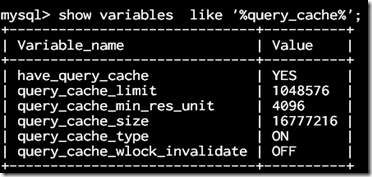
首先,我们可以确认,mysql的query_cache功能是打开的。
其次,我们看一下状态:
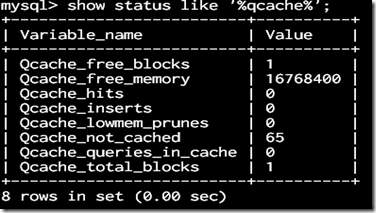
因为这个db是新的db,所以hits,inset都为0,现在我们执行一条select语句:
状态变为:
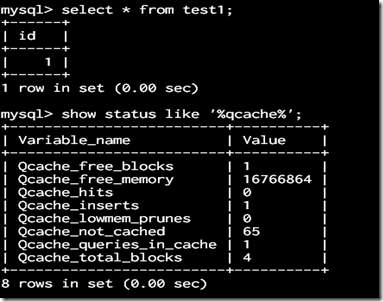
可以看到,执行一条select后,现在的qcache状态为,insert+1,这样我们就可以推断出,现在刚才那条select语句已经加入了qcache中。那我们现在再将刚才那条sql前面加上空格,看看会怎样呢?
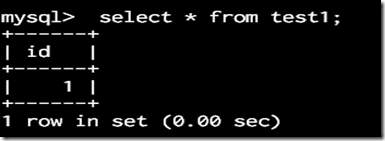
请注意,这条sql,比刚才那条sql前面多了一个空格。
按照网上的理论,这条sql应该会作为另一个键而插入另一个cache,不会复用先前的cache,但结果呢?
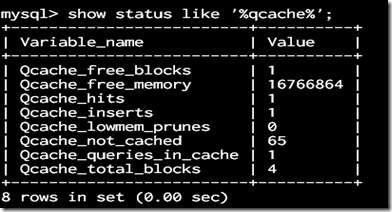
我们可以看到,hits变为了1,而inserts根本没变,这就说明了,这条在前面加了空格的query命中了没有空格的query的结果集。从这,我们就可以得出结论,网上先前流传的说法,是不严谨的。
那究竟是怎么回事呢?到底应该如何呢?为什么前面有空格的会命中了没有空格的query的结果集。其实,这些我们可以通过源码获得答案。
翻看下mysql的源码,我这翻看的是5.1的,在send_result_to_client(这个函数既是mysql调用query_cache的函数)这个函数里面有这样一段,
| /* Test if the query is a SELECT (pre-space is removed in dispatch_command). First ‘/’ looks like comment before command it is not frequently appeared in real life, consequently we can check all such queries, too. */ if ((my_toupper(system_charset_info, sql[i]) != ‘S’ || my_toupper(system_charset_info, sql[i + 1]) != ‘E’ || my_toupper(system_charset_info, sql[i + 2]) != ‘L’) && sql[i] != ‘/’) { DBUG_PRINT(“qcache”, (“The statement is not a SELECT; Not cached”)); goto err; } |
这段代码,是在检验语句是否为select语句,重点是上面那段注释。特别是括弧中的,pre-space is removed in dispatch_command,也就是说,在语句开始之前的多余的空格已经被处理过了,在dispache_command这个函数中去掉了。
我们看下dispache_command这个方法,在这个方法里有这样一段:
| if (alloc_query(thd, packet, packet_length)) break; // fatal error is set char *packet_end= thd->query() + thd->query_length(); /* ‘b’ stands for ‘buffer’ parameter’, special for ‘my_snprintf’ */ const char* end_of_stmt= NULL; |
在这里,会调用alloc_query方法,我们看下这个方法的内容:
| bool alloc_query(THD *thd, const char *packet, uint packet_length) { char *query; /* Remove garbage at start and end of query */ while (packet_length > 0 && my_isspace(thd->charset(), packet[0])) { packet++; packet_length–; } const char *pos= packet + packet_length; // Point at end null while (packet_length > 0 && (pos[-1] == ‘;’ || my_isspace(thd->charset() ,pos[-1]))) { pos–; packet_length–; } /* We must allocate some extra memory for query cache The query buffer layout is: buffer :== <statement> The input statement(s) ‘�’ Terminating null char (1 byte) <length> Length of following current database name (size_t) <db_name> Name of current database <flags> Flags struct */ if (! (query= (char*) thd->memdup_w_gap(packet, packet_length, 1 + sizeof(size_t) + thd->db_length + QUERY_CACHE_FLAGS_SIZE))) return TRUE; query[packet_length]= ‘�’; /* Space to hold the name of the current database is allocated. We also store this length, in case current database is changed during execution. We might need to reallocate the ‘query’ buffer */ char *len_pos = (query + packet_length + 1); memcpy(len_pos, (char *) &thd->db_length, sizeof(size_t)); thd->set_query(query, packet_length); /* Reclaim some memory */ thd->packet.shrink(thd->variables.net_buffer_length); thd->convert_buffer.shrink(thd->variables.net_buffer_length); return FALSE; } |
这个方法在一开始就会对query进行处理(代码第4行),将开头和末尾的garbage remove掉。
看到这里,我们基本已经明了了,mysql会对输入的query进行预处理,将空格等东西给处理掉,所以不会开头的空格不会影响到query_cache,因为对mysql来说,就是一条query。
我们一直都在努力坚持原创.......请不要一声不吭,就悄悄拿走。
我原创,你原创,我们的内容世界才会更加精彩!
【所有原创内容版权均属TechTarget,欢迎大家转发分享。但未经授权,严禁任何媒体(平面媒体、网络媒体、自媒体等)以及微信公众号复制、转载、摘编或以其他方式进行使用。】
微信公众号
TechTarget
官方微博
TechTarget中国
作者
相关推荐
-
2017年5月数据库流行度排行榜 MySQL与Oracle“势均力敌”
数据库知识网站DB-engines.com最近更新了2017年5月的数据库流行榜单。TechTarget继续与您一起分享最新的榜单情况。
-
2017年3月数据库流行度排行榜 Oracle卫冕之路困难重重
时隔一个月,数据库市场经过一轮“洗牌”,旧的市场格局是否会被打破,曾经占巨大市场份额的企业是否可能失去优势?
-
2017年2月数据库流行度排行榜 攻城容易守城难
2016年下半年,数据库排行榜的前二十名似乎都“固守阵地”,在排名上没有太大的变动。随着2017年的悄然而至,数据库的排名情况是否会有新的看点?
-
MySQL管理特性:让企业适合交易平台
当Alexander Culiniac和他的同事在TickTrade系统公司建立一个基于云的交易平台时,面临一些基本的约束。那就是,系统必须在云上工作良好并且经济实用。
